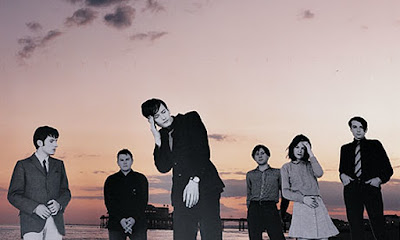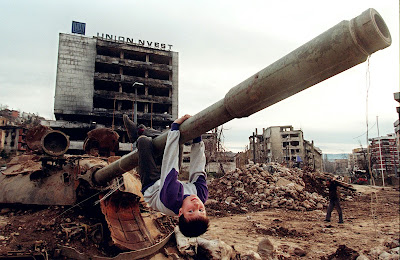But here's an anniversary nobody else has bothered with - twenty years since the release of my favourite charity album. On 4 September 1995 twenty groups went into Abbey Road studios to each record a track. The result is a day-in-the-life of a musical genre at its peak.
1995 was also the year I returned to England after a two year sabbatical in Ireland. Politically the country was just as moribund as when I'd left, with an unpopular right wing government that by then nobody would actually admit they voted for, but culturally the place was finally coming alive.
I was after the underground protest movement that was springing up, especially the Road Protest Movement, which by then had parted company with the ground completely and was occupying Stanworth Valley, in my home county of Lancashire, to stop the extension of the M65 motorway.
 However mainstream culture was also finding its vibe. Madchester had died a little while earlier, but
However mainstream culture was also finding its vibe. Madchester had died a little while earlier, butBritpop was very much alive and well. Guitars had been creeping back into the charts for a while thanks to Grunge, but US misery and fake poverty wasn't everyone's up tea. Instead but now guitar based pop was as much in vogue as it had been twenty or thirty years earlier.
And October 1995 was to be a huge month for British music. First Blur released The Great Escape, then Oasis retaliated with (What's the Story) Morning Glory before finally the relatively unknown Pulp blew them both out of the water with Different Class. All three albums are pop rock at their very best.
In due course the whole Cool Britannia thing would become just a small Metropolitan elite and Britpop would be just another unreconstructed aspect of male lad culture, but in the mid-nineties it was about Working Class bands from across the country writing music that meant something to them. It was a reaction against both US imported Grunge and locally produced plastic pop. And it rocked.
The government may have been hated, but the country as a whole was doing better. Since dropping out of the European Exchange Rate mechanism (the precursor to the Euro) the British economy had been recovering steadily. But there were clouds on the horizon. War in the east had led to failed military intervention and a refugee crisis. This time though it was Bosnia and not Syria.
 The War Child charity intended to do something about this though and so it persuaded some of the
The War Child charity intended to do something about this though and so it persuaded some of the best and brightest stars of Britpop to enter the most famous studio in England to record an album that would be released five days later. So quick was the process that there wasn't even time to put a track listing together. The result is varied, but very interesting.
Ticking off the stand-out tracks could take a while.
The best track for me is Sinead O'Connor's version of Ode to Billy Joe is a brilliant version of a great song. Having started out as a pop star then turned into a media personality, Sinead O'Connor the performer had almost been forgotten along the way, but she really can sing.
Then we had the founder of Britpop, Suede, with their version of Elvis Costello's Shipbuilding, the Manic Street Preachers with their cover of Raindrops Keep Falling On My Head, and a nod to the alternative scene with The Leveller's still very relevant song about fortress Europe Searchlights. Searchlights. Paul McCartney and friends, who included Paul Weller and Noel Gallagher, recorded another version of Come Together whilst Gallagher and his brother and their friends, which included Kate Moss and her boyfriend Jonny Depp, re-recorded Fade Away.
There was also Radiohead, Orbital, the Boo Radley's (who I always thought a better live act than Oasis), Portishead, Massive Attack (I usually skip this one), and plenty more including the other half the Battle of Britpop, Blur.
 Finally we had the return of the enigmatic KLF foundation, this time under the name of One World Orchestra. Their track The Magnificent was a drum and bass version of the Magnificent Seven theme, with the haunting sampled vocals of Serbian DJ Fleka "Humans against killing: that sounds like a junkie against dope".
Finally we had the return of the enigmatic KLF foundation, this time under the name of One World Orchestra. Their track The Magnificent was a drum and bass version of the Magnificent Seven theme, with the haunting sampled vocals of Serbian DJ Fleka "Humans against killing: that sounds like a junkie against dope". KLF, who had just burnt a million quid to show their contempt for money, realised the irony of their
contribution to a charity album. They said they regretted getting involved and that the track was "shit". However the next year protests erupted in Belgrade against the dictatorship of Slobodan Milošević, the chief architect of the Bosnian disaster, the track became the anthem of the resistance, making the track the most relevant on the album.
Britpop carried on for two more wonderful years, before Oasis peaked, Blur reinvented themselves, Pulp became disillusioned, New Labour got elected and The Verve told us The Drugs Don't Work any more. The world moved on, but the Help album remains a slice of life an the heart of a musical movement at its best, and is still worth a listen.




No comments:
Post a Comment